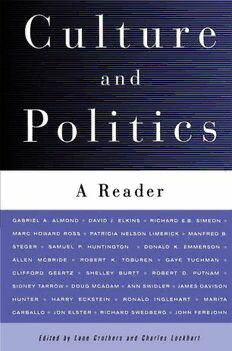Table Of ContentCulture and Politics
Culture and Politics
A Reader
Edited by Lane Crothers and Charles Lockhart
St. Martin's Press
New York
CULTURE AND POLITICS: A READER
Copyright © 2000 Lane Crothers and Charles Lockhart. All rights reserved.
No part of this book may be used or
reproduced in any manner whatsoever without written permission except in the
case of brief quotations embodied in critical articles or reviews. For informa
tion, address St. Martin's Press, Scholarly and Reference Division, 175 Fifth
Avenue, New York, N.Y. 10010.
ISBN 978-0-312-23300-6 ISBN 978-1-349-62965-7 (eBook)
DOI 10.1007/978-1-349-62965-7
Library of Congress Cataloging-in-Publication Data to be found at the Library
of Congress.
First edition: July 2000
10 9 8 7 6 5 4 3 2 1
To Aaron Wildavsky, Scholar and Teacher
CONTENTS
Acknowledgments IX
Permissions Xl
Editors' Introduction xv
PART I: CONCEPTS AND APPLICATIONS
Introduction 1
1. The Study of Political Culture, Gabriel A. Almond 5
2. A Cause in Search of Its Effect, or What Does Political
Culture Explain? David J. Elkins and Richard E. B. Simeon 21
3. Culture and Identity in Comparative Political Analysis,
Marc Howard Ross 39
4. The Startling Ability of Culture to Bring Critical
Inquiry to a Halt, Patricia Nelson Limerick 71
PART II: CULTURE AND GLOBALIZATION
Introduction 75
5. Socialism and the Ideological Dimensions of
Globalization, Manfred B. Steger 79
6. The Clash of Civilizations? Samuel P. Huntington 99
7. Singapore and the "Asian Values" Debate,
Donald K. Emmerson 119
PART III: POPULAR CULTURE
Introduction 129
8. Deep Structures: Polpop Culture on Prime time
Television, Allen McBride and Robert K. Toburen 133
9. The Symbolic Annihilation of Women by
the Mass Media, Gaye Tuchman 150
10. Deep Play: Notes on the Balinese Cockfight, Clifford Geertz 175
PART IV: CIVIL SOCIETY AND SOCIAL CAPITAL
Introduction 203
11. The Politics of Virtue Today: A Critique and
a Proposal, Shelley Burtt 207
12. Bowling Alone: America's Declining Social
Capital, Robert D. Putnam 223
13. Making Social Science Work Across Space and Time:
A Critical Reflection On Robert Putnam's
Making Democracy Work, Sidney Tarrow 235
PART V: SOCIAL MOVEMENTS, COLLECTIVE IDENTITY,
AND POLITICAL CULTURE
Introduction 249
14. Culture and Social Movements, Doug McAdam 253
15. Cultural Power and Social Movements,Ann Swidler 269
16. Cultural Conflict in America, James Davison Hunter 284
PART VI: CULTURE AND POLITICAL CHANGE
Introduction 303
17. A Culturalist Theory of Political Change, Harry Eckstein 307
18. Does Latin America Exist? (And Is There a Confucian Culture?),
Ronald Inglehart and Marita Carballo 325
19. Patterns of Response, Samuel P. Huntington 348
PART VII: CULTURE AND RATIONALITY
Introduction 359
20. Social Norms and Economic Theory,Jon Elster 363
21. Socioeconomics and the New "Battle of Methods":
Toward a Paradigm Shift? Richard Swedberg 381
22. Rationality and Interpretation: Parliamentary Elections in
Early Stuart England,John Ferejohn 393
Notes 413
Index 435
ACKNOWLEDGMENTS
No project can ever be accomplished without the help, assistance, and patience
of innumerable people. Our debt is sufficiently wide and deep that we apolo
gize in advance for likely failing to recall accurately and acknowledge here all
the valuable contributions that others have provided.
First, we express our gratitude to Richard Ellis ofWillamette University. We
sought Richard's advice regularly when this project was first under way, and it
was freely given and invaluable. Richard's suggestions live on in the organiza
tion and even the title of this volume. In particular, his careful consideration of
how to present the various ideas that form this volume has been crucial to shap
ing its finished version. We are extremely pleased to have this opportunity to
recognize his generous help.
Earlier in our lives we benefited from the knowledge and inspiration of
numerous scholars. In particular, Gabriel Almond and Sidney Verba, whose
many works are cited repeatedly throughout this volume, made political culture
a central component of political science and of our careers. Similarly, the influ
ence of Richard Pride at Vanderbilt University brought an excitement to the
subject that proved impossible to resist; without his influence, this project liter
ally would not have come to life. Aaron Wildavsky also taught us how to con
ceptualize the political ramifications of culture in a different way that is
exceptionally useful and has stimulated our thought and our fascination with
political culture.
We derived much benefit as well from the active support and suggestions of
Manfred Steger at Illinois State University. His careful reading of the manuscript
in its early phases contributed much to its final form. Jamal Nassar and Tom
Eimermann, both of Illinois State University as well, are also due great thanks
for their unflagging professional support and personal friendship. The extraor
dinary insight and inspiration as well as the generous support of these various
scholars and colleagues brighten our lives beyond measure.
Additionally, a number of people and organizations ably facilitated this proj
ect in a variety of critical practical ways. Robert Putnam, whose "Bowling

